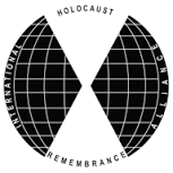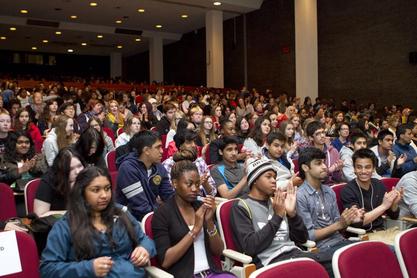THE INTERNATIONAL HOLOCAUST REMEMBRANCE ALLIANCE
Article written by Sofia Domino - with the permission of The International Holocaust Remembrance Alliance.

The International Holocaust
Remembrance Alliance (IHRA) touched my heart. I believe that what they do,
their work, their mission and their programs are very inspirational.
This is why I want to share with you some information about them today. IHRA is an intergovernmental body whose purpose is to place political and social leaders’ support behind the need for Holocaust education, remembrance and research both nationally and internationally.
IHRA (formerly the Task Force for International Cooperation on Holocaust Education, Remembrance and Research, or ITF) was initiated in 1998 by former Swedish Prime Minister Göran Persson. Persson decided to establish an international organization that would expand Holocaust education all over the world, and asked President Bill Clinton and former British Prime Minister Tony Blair to join him in this effort.
IHRA grew out of an international forum of governments, which took place in Stockholm on 27-29 January 2000. The Forum was attended by 23 Heads of State or Prime Ministers and 14 Deputy Prime Ministers or Ministers from 46 governments. The Declaration of the Stockholm International Forum on the Holocaust ( CLICK HERE ) was the outcome of the Forum’s deliberations and is the foundation of the International Holocaust Remembrance Alliance.
IHRA has numerous programs and each of them is very interesting and useful. Let’s see together what programs they have:
This is why I want to share with you some information about them today. IHRA is an intergovernmental body whose purpose is to place political and social leaders’ support behind the need for Holocaust education, remembrance and research both nationally and internationally.
IHRA (formerly the Task Force for International Cooperation on Holocaust Education, Remembrance and Research, or ITF) was initiated in 1998 by former Swedish Prime Minister Göran Persson. Persson decided to establish an international organization that would expand Holocaust education all over the world, and asked President Bill Clinton and former British Prime Minister Tony Blair to join him in this effort.
IHRA grew out of an international forum of governments, which took place in Stockholm on 27-29 January 2000. The Forum was attended by 23 Heads of State or Prime Ministers and 14 Deputy Prime Ministers or Ministers from 46 governments. The Declaration of the Stockholm International Forum on the Holocaust ( CLICK HERE ) was the outcome of the Forum’s deliberations and is the foundation of the International Holocaust Remembrance Alliance.
IHRA has numerous programs and each of them is very interesting and useful. Let’s see together what programs they have:
EDUCATION:

As one of the three principle areas
of activity within the organization, the Education Working Group brings
together experts in Holocaust education from around the world to provide
expertise, advice, and recommendations about Holocaust education.
As the Stockholm Declaration states, “We share a commitment to encourage the study of the Holocaust in all its dimensions. We will promote education about the Holocaust in our schools and universities, in our communities and encourage it in other institutions.”
IHRA also offers help to teachers and educators who, often ask why we should teach and learn about the Holocaust when other crimes against humanity are being perpetrated today. IHRA encourages teachers and educators to download a series of documents, in different languages, created by IHRA's Education Working Group. They offer ideas and recommendations to educators who wish to teach about the Holocaust and its relationship to other genocides and crimes against humanity.
As the Stockholm Declaration states, “We share a commitment to encourage the study of the Holocaust in all its dimensions. We will promote education about the Holocaust in our schools and universities, in our communities and encourage it in other institutions.”
IHRA also offers help to teachers and educators who, often ask why we should teach and learn about the Holocaust when other crimes against humanity are being perpetrated today. IHRA encourages teachers and educators to download a series of documents, in different languages, created by IHRA's Education Working Group. They offer ideas and recommendations to educators who wish to teach about the Holocaust and its relationship to other genocides and crimes against humanity.
COMMEMORATE:

As stated in the Stockholm
Declaration, “We share a commitment to commemorate the victims of the
Holocaust and to honour those who stood against it. We will encourage
appropriate forms of Holocaust remembrance, including an annual Day of Holocaust
Remembrance, in our countries.”
The work of the MMWG is focused on forms of cultural remembrance that seek to anchor the Holocaust in the collective memory of contemporary and future societies. Particular importance is attached to memorials at historic sites of the Holocaust, memorial museums as "cultural sites" of memory and remembrance, and the implementation and form of national Holocaust remembrance days.
The work of the MMWG is focused on forms of cultural remembrance that seek to anchor the Holocaust in the collective memory of contemporary and future societies. Particular importance is attached to memorials at historic sites of the Holocaust, memorial museums as "cultural sites" of memory and remembrance, and the implementation and form of national Holocaust remembrance days.
RESEARCH:
As one of the three principle areas
of activity within the organization, the Academic Working Group convenes an
international body of scholars. In addition to encouraging international
cooperation with respect to research and scholarship in the fields of Holocaust
studies, broadly defined, the AWG continues to work toward free access to
archival material in all countries relevant to Holocaust and genocidal
studies.
Accomplishments of the AWG include:
- Compliations of ongoing research programs on the Holocaust and Holocaust -related subjects.
- Worked with other interested parties in order to fully open the International Tracing Service (ITS) Archives for scholarly (and other) research.
- Continued work towards opening of Holocaust-related archives in the Vatican and North African countries.
- Development of the Memory of the Holocaust: Culture of Remembrance conference in Vienna in 2006.
Accomplishments of the AWG include:
- Compliations of ongoing research programs on the Holocaust and Holocaust -related subjects.
- Worked with other interested parties in order to fully open the International Tracing Service (ITS) Archives for scholarly (and other) research.
- Continued work towards opening of Holocaust-related archives in the Vatican and North African countries.
- Development of the Memory of the Holocaust: Culture of Remembrance conference in Vienna in 2006.
COMMITTEES:

IHRA has three committees that bring experts from all Working Groups
together to address topics that are of contemporary interest to the IHRA and of
a cross-cutting nature across its three principle areas of activity.
These committees are the Committee on Antisemitism and Holocaust Denial, the
Committee on the Genocide of the Roma, and the Committee on the Holocaust,
Genocide, and Crimes Against Humanity.
A recent achievement of the Committee on Antisemitism and Holocaust Denial is the Working Definition of Holocaust Denial and Distortion, which can be read here: CLICK HERE
I highly recommend you to visit IHRA official website, to learn more about them and to keep up-to-date: CLICK HERE
A recent achievement of the Committee on Antisemitism and Holocaust Denial is the Working Definition of Holocaust Denial and Distortion, which can be read here: CLICK HERE
I highly recommend you to visit IHRA official website, to learn more about them and to keep up-to-date: CLICK HERE
